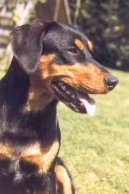Austrian pinscher (Dog standard)
The Austrian Pinscher descends from the ancient Austrian country pinschers that were widespread still in the second half of the 19th century, being modest, versatile farm dogs.
FCI-Standard N° 64 / 05. 03. 2003 / GB
AUSTRIAN PINSCHER
(Österreichischer Pinscher)
TRANSLATION : Elke Peper.
ORIGIN : Austria.
DATE OF PUBLICATION OF THE ORIGINAL VALID STANDARD : 25.03.2003.
UTILIZATION : Watch- and companion dog.
CLASSIFICATION F.C.I. : Group 2 Pinscher and Schnauzer-Molossoid breeds- Swiss Mountain- and Cattle Dogs and other breeds.
Section 1.1 Pinscher.
Without working trial.
BRIEF HISTORICAL SUMMARY : The Austrian Pinscher descends from the ancient Austrian country pinschers that were widespread still in the second half of the 19th century, being modest, versatile farm dogs. In 1921 the systematic pure breeding of this breed began. On Oct. 16th, 1928, the breed was recognized by the Austrian Kennel Club (Österreichischer Kynologenverband) as Österreichischer kurzhaariger Pinscher (Austrian ShortHAIRed Pinscher). In the year 2000 the breed was renamed Österreichischer Pinscher (Austrian Pinscher).
GENERAL APPEARANCE : Stocky dog of medium SIZE with lively and bright expression.
IMPORTANT PROPORTIONS :
The ratio of height at withers to length of BODY is 9 to 10.
The ratio of length of muzzle to length of skull is 4 to 6.
BEHAVIOUR / CHARACTER : Assertive, lively, alert, playful and especially devoted and friendly dealing with people familiar to him. Towards strangers he is suspicious and an incorruptible guard. His hunting instinct is only slightly developed.
HEAD : Pear-shaped; in harmonious proportion to the BODY.
CRANIAL REGION : Broad and rounded with pronounced frontal furrow and groove.
Skull : Distinctly developed zygomatic arches, strong masticatory muscles.
Stop : Well marked.
FACIAL REGION :
Nose : Black.
Muzzle : Strong, nasal bridge straight.
Lips : Tight, smooth, well fitting, with dark pigmentation.
Jaws/Teeth : Strong, complete scissor bite.
Eyes : Large eyeball in round palpebral aperture, eyerims close-fitting with dark pigmentation.
Ears : Button ear (folded ear), small, set on high.
NECK : Strong, of medium length.
BODY :
Withers : Well defined.
Back : Short, broad, straight, tight.
Loin : Short and broad.
Croup : Long and broad.
Chest : Long, deep, broad, barrel-shaped; well developed forechest. The muscles of the chest are strong and tight.
Belly : Slightly tucked up.
TAIL : High set, strong, of medium length and densely covered with HAIR.
LIMBS : Strong bone.
FOREQUARTERS : Well muscled, straight legs, broad front.
Shoulders : Shoulder blade long, well laid-back.
Upper arm : Obliquely set.
Forearm : Of medium length, straight.
Carpal joint : Strong.
Pastern : Short, moderately sloping.
HINDQUARTERS : Well angulated.
Upper thigh : Broad.
Lower thigh : Of medium length.
Hock joint : Strong.
Metatarsus : Short.
FEET : Close-knit with strong nails.
GAIT / MOVEMENT : Flowing and harmonious MOVEMENT covering a lot of ground.
SKIN : Tight fitting.
COAT :
HAIR : Thick double COAT. The outer COAT is short to medium-long, thick, smooth and close-lying. The underCOAT is thick and short, buttocks slightly trousered.
COLOUR : Russet gold (semmelgelb), brownish yellow, stag-red, black with tan-COLOURed markings. White markings: chest patch, muzzle, NECK, throat, nape, FEET and tip of TAIL. Lack of white markings is not a fault.
SIZE :
Height at the withers :
42 – 50 cm.
(Males: 44 – 50 cm),
(Bitches: 42 – 48 cm).
FAULTS : Any departure from the foregoing points should be considered a fault and the seriousness with which the fault should be regarded should be in exact proportion to its degree.
ELIMINATING FAULTS :
Aggressive or overly shy.
Undershot, overshot.
Any dog clearly showing physical or behavioural abnormalities shall be disqualified.
N.B. : Male animals should have two apparently normally developed testicles fully descended into the scrotum.
Source: FCI >>> |


